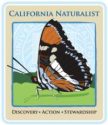For those of you who appreciate the outdoors and are interested in California’s vast and abundant natural resources, a new volunteer training is beginning Wednesday, September 17 in Tuolumne County. Sponsored by the University of California, “The California Naturalist Program is designed to introduce Californians to the wonders of our unique ecology and engage the public in study and stewardship of California’s natural communities” (http://calnat.ucanr.edu/).
UC Cooperative Extension Central Sierra (covering Amador, Calaveras, El Dorado and Tuolumne Counties) received a Renewable Resources Extension Act grant to bring the program to the Sierra foothills. UCCE will host the first-ever California Naturalist – Central Sierra training class in Tuolumne County, beginning September 17 and continuing through December 10. The class will be held from 6:30 – 9:00 p.m. at New Melones Visitor Center, at the corner of Highway 49 and Studhorse Flat Road, just outside Columbia.
The California Naturalist program seeks to provide information designed to enhance understanding of and create respect for the breath-taking diversity of California’s natural communities. The training class will offer field discovery opportunities along with classroom lectures about various natural resources. Topics presented in a typical training program include: California geology, climate and soils; water; plants; forest and range management; animals; energy; and citizen science.
What is citizen science? It is the involvement of non-professional (unpaid) naturalists in observation, monitoring, reporting or participation in projects that provide quantifiable information. This year, California Naturalist – Central Sierra trainees will actively participate in the Great Sierra River Cleanup at New Melones on Saturday, September 20. They will work with other volunteer groups to collect garbage exposed by declining water levels. And they will document and report the amount and kinds of garbage collected to the Sierra Nevada Conservancy, the sponsor of the Great Sierra River Cleanup.
Aspiring California Naturalists complete 40 hours of classroom and field training designed to increase personal connection to the natural world. They create and complete a capstone project, such as an interpretive presentation, during the course of the training class. Upon completion of training, California Naturalists may apply for four educational credits offered through the UC Davis Extension program. California Naturalists are encouraged to complete 40 hours of community volunteer service in one of four areas: program support, interpretation/education, restoration/conservation and/or citizen science.
Once you are certified, you will have opportunities to volunteer all over the state with various federal, state, local and non-profit organizations. Naturalists can get involved in many different kinds of activities:
- Scientific research—plant identification or data collection
- Environmental monitoring—bird counts, stream sampling, invasive species monitoring
- Restoration or conservation plans—seed collection, native plant propagation and planting
- Education—developing signs or brochures or leading nature hikes to help make science more accessible to others through support for the Naturalist Program, or other outreach activities.
Information about the California Naturalist – Central Sierra program is available at http://cecentralsierra.ucanr.edu/California_Naturalist/ There is still time to apply – the early registration period has been extended to September 15. To register, go to http://cecentralsierra.ucanr.edu/California_Naturalist/Becoming_California_Naturalist/ and click on “11-Week Adult Course Registration.”
Information adapted from the UC California Naturalist program website, http://calnat.ucanr.edu, provided by Adina Merenlander, UC Berkeley Associate Cooperative Extension Specialist, supported by a National Science Foundation grant.


